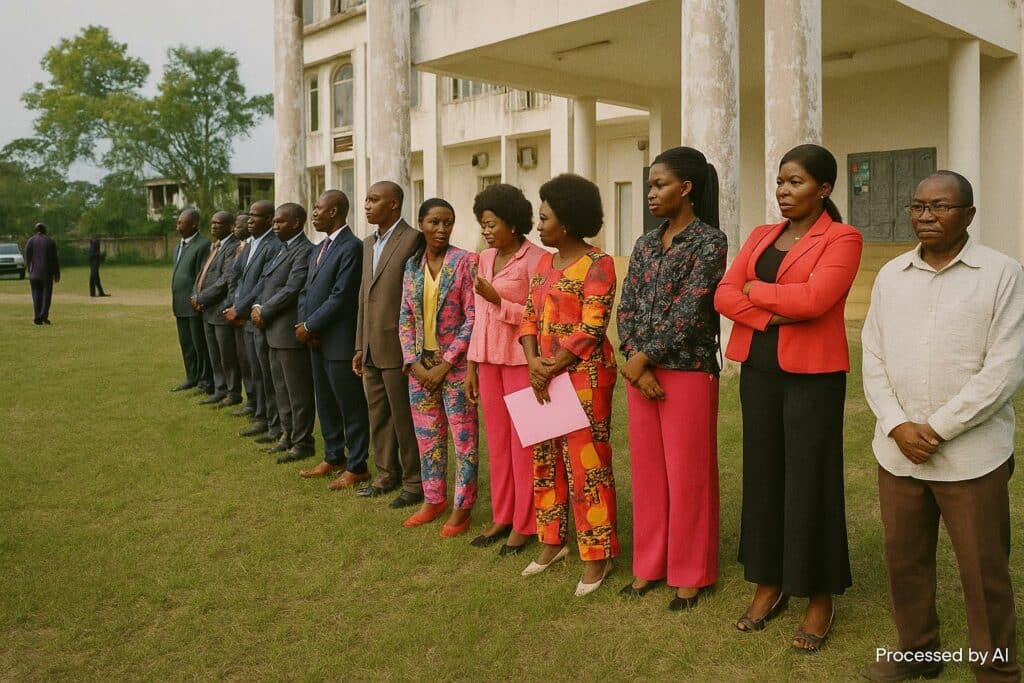A Firm Reminder from the Prefect of Likouala
Under the humid dawn light of Impfondo’s main square, Prefect Jean Pascal Koumba raised the tricolour and, in measured tones, invited his departmental directors to remain physically and morally present at their desks. His admonition, delivered during the weekly flag-hoisting ceremony, was more than a ritual lecture. It was a carefully timed reminder that the credibility of local governance often rests on simple assiduity. According to dispatches from the Agence Congolaise d’Information, a non-negligible number of senior civil servants have decamped to Brazzaville or Pointe-Noire, leaving junior staff to navigate budgets, payrolls and restive publics. In Likouala, a region the size of Portugal yet connected by a single paved artery, such absences translate immediately into stalled paperwork and delayed field missions.
Diplomats following Congo-Brazzaville’s decentralisation agenda note that the prefect’s statement dovetails with the presidency’s broader call for performance contracts within the civil service. President Denis Sassou Nguesso’s Plan national de développement 2022-2026 assigns to each department quantitative targets on health coverage, school enrolment and rural connectivity. By foregrounding discipline rather than sanction, Mr Koumba appears to align with a managerial ethos that privileges persuasion over coercion while keeping open the option of administrative recall for the most recalcitrant.
Logistical and Fiscal Hurdles in a Forested Hinterland
Likouala’s geographic isolation complicates even the most enthusiastic reform narrative. Year-round navigability of the Oubangui River is hampered by seasonal sandbanks, and only intermittent flights link Impfondo to the capital. The prefect therefore underscored what he termed “objective constraints” that continue to weigh on project delivery: high fuel prices, fluctuating river levels and a shortage of qualified engineers willing to relocate north of the equator. The Ministry of Finance has, since March, channelled additional credit lines to the département, yet execution rates remain below fifty percent, according to a March budget monitoring note consulted by regional observers.
International partners acknowledge those structural handicaps. A 2023 World Bank logistics diagnostic placed Congo-Brazzaville forty-seventh out of fifty-three African states for intranational freight reliability, a ranking that resonates acutely in Likouala’s swampy expanse. Nevertheless, the prefect insisted that logistical adversity must not become an excuse for absenteeism; rather, it should galvanise enterprising cadres to craft locally adapted solutions, from riverine barges to prefabricated bridge spans.
Sino-Congolese Cooperation: Bridges, Roads and Soft Power
Concrete responses to Likouala’s infrastructure deficit increasingly bear a Mandarin accent. The forthcoming resumption of work on Impfondo’s sports complex, entrusted to the China Jiangsu International Group, is emblematic. Representatives of the Chinese embassy, speaking on condition of professional anonymity, describe the project as a “friendship landmark” designed both to nurture youth talent and to project a narrative of mutually beneficial South-South cooperation. Similar symbolism accompanies the planned rehabilitation of the Dongou-Impfondo-Épena road corridor and the twin bridges over the Motaba and Ibenga rivers.
Congo-Brazzaville’s authorities view these ventures as an operational extension of the Forum on China–Africa Cooperation commitments reiterated in Beijing last year. In Brazzaville, officials stress that concessional financing remains within sustainable thresholds established by the IMF’s 2022 debt-sustainability analysis, an argument echoed by regional economists such as Armand Ngouelem of the CEMAC Business Observatory. For Likouala’s residents, however, the calculus is more immediate: a passable road can reduce the price of a sack of cassava by a third and cut the travel time to the district hospital from two days to six hours.
Social Resonance of Health and Sporting Infrastructure
Beyond macroeconomic indicators, the renewed pace on social infrastructure speaks to the population’s daily aspirations. The general hospital of Impfondo, whose second construction team will soon augment on-site capacity, promises to deliver advanced obstetric and surgical services that currently require evacuation to Brazzaville. Local NGOs trace preventable maternal mortality spikes to transport delays as much as to clinical shortages. A fully operational hospital could hence serve as a litmus test for the government’s commitment to universal health coverage.
Parallel attention to a modern sports complex reflects an appreciation of soft-power dividends. In a conversation with ACI correspondents, departmental youth leader Emery Likkou highlighted the facility’s potential to deter juvenile delinquency and foster national cohesion through athletic tournaments. Sporting diplomacy, the argument goes, supplements classic nation-building tools and generates a sense of ownership among the youth, a demographic that accounts for sixty-five percent of Likouala’s population.
From Administrative Presence to Developmental Momentum
Sceptics may question whether a single appeal for assiduity can reverse years of understaffing. Yet administrative scholars often cite what they call the “first-mile principle”: when the state visibly shows up, citizens recalibrate their expectations and engagement levels. The prefect’s clarion call, delivered against the flag’s ascent, therefore serves both symbolic and functional purposes. It puts local bureaucrats on notice while reassuring external investors that on-the-ground partners are present and accountable.
As the rainy season approaches, bulldozers and health-care architects alike will test the fidelity of these pledges. For now, the message from Impfondo is unambiguous: disciplined public service is the indispensable catalyst that can convert signed contracts and allocated budgets into asphalt, reinforced concrete and, ultimately, into a tangible improvement in the life chances of Likouala’s half-million inhabitants.

